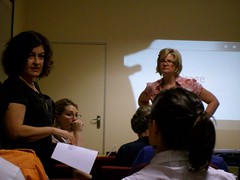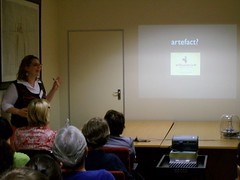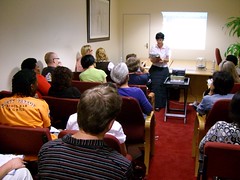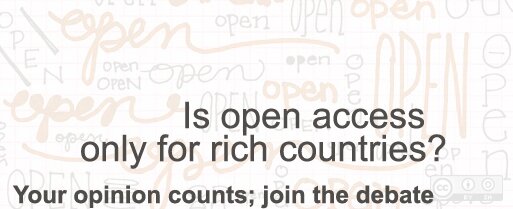First iHeritage seminar on Digitisation and Access
Friday, February 13, 2009 13:50
Merle Ruff from Sabinet introduces herself and her project. Heather Ford, the iHeritage project lead, stands in the background.
On Tuesday, 3 February, the seminar on ‘Digitisation and Access: Tools for cultural heritage institutions’ was held at the African Commons Project offices. Representatives from South African archives and heritage institutions, government and university departments, art collectives, creators and business representatives attended the event with the hope of finding out more about digitization and the implications of making their collections available online.
Facilitated by Heather Ford and Rebecca Kahn, the seminar aimed to provide professionals working in cultural heritage spaces with more information on how to make their collections openly accessible online, useful legal and digital tools that are available, and how to get the public involved in building their collections.
Heritage goes full circle
Heather Ford kicked off the event by discussing how perceptions of heritage and access to that heritage has changed over time – from the storytellers who sat around camp fires telling and retelling histories, to the ‘cabinets of curiosity’ and museums as we know them today that tell us to “look but don’t touch” (or take photos).
Heather then explained how the internet has provided an alternative perspective to how heritage is accessed – it is a global portal where all people can be involved in not only looking, but collectively telling their histories, showing their artifacts and then sharing them with the world.
Heather explained more about what the iHeritage project plans to undertake over the next few months, including research, training, seminars and software testing. For more information on this project take a look at the presentation slides on the updated ‘about’ page.

Rebecca Kahn presented on Cultural Artefacts – Online Archives for South African Heritage
Modern day artifacts
Rebecca Kahn spoke about new notions of artifacts in our digital age (see this video example here) and how these are being stored in new ‘archives’ such as Google, Flickr and Youtube. The issue here is that these online tools have not been built for archival purposes so Rebecca showcased some online tools that are effectively storing digital content under open licenses:
1. Archive.org backdates and stores pages on the internet every five days through the Way Back Machine. The result? Eighty-five billion web pages archived from 1996, all under a reusable license.
2. Archive-it.org is a do-it-yourself web archive for institutions to preserve their digital content. This is paid-for but it is a user-friendly application that takes care of the technology so that you can focus on the archiving.
3. Project Gutenberg is the first and largest single collection of free electronic books, available in a variety of languages, all in the public domain.
The benefits of using these types of tools is that they effectively takes care of the technology for you, they allow artifacts to be shared across the internet under free license, and you are assured of their longevity as they make efforts to store the data on servers in many locations around the world. The problem with these is that there is very little local content and local languages being showcased on these platforms – though the best way to remedy this is to hop in and start participating in this digital democracy.

Catherine Kennedy from the South African History Archive discusses her organisation’s efforts to digitise 4,000 Struggle posters and art dating from 1940 through to the 1980’s.
Copyright in context
Catherine Kennedy from Wits’ South African History Archive spoke about their poster digitization project and the challenges that they face in the context of South Africa’s legal and historical framework.
The project is an initiative that will digitize 4,000 Struggle posters and artworks dating back to the 1940’s through to the 1980’s, and make them available to the public for noncommercial educational purposes. As these posters were created collaboratively with no specific creators or copyright bearers, a process has been undertaken to trace the people involved in producing them in order to ask for permission to digitize and share their artworks. It has been a difficult process, which has made it evident that the Copyright Act needs to be reviewed in order to take into account the specific circumstances that South Africa’s fractured history has created, especially in relation to preserving our heritage artifacts.
Heritage vaults?
James Cairns, an attendee at the event had a strong message to pass on. He’s a scriptwriter for television and theatre productions, and considers himself a ‘consumer’ of the heritage knowledge discussed in the seminar. He made the point that archival institutions shouldn’t consider themselves as heritage ‘vaults’, but should rather be making information available for the benefit of the people of South Africa, especially to the producers and creators of media to make more reflective content. James said that there are creators who are working to bring history to life through popular media, and not being able to access the facts makes it difficult to hold true to the stories of the past.
Through further discussions and comments during the seminar it was evident that concerns around fundraising and government buy-in were top of the agenda. Advocacy needs to happen, but with that funding is needed. There are companies who want to fund these initiatives, but the unclear nature of Copyright legislation in this field is a deterrent. As Catherine had said, a review of the Copyright Act is much needed in order to improve the situation as a whole. There were calls for representatives from the Department of Education and Telecommunications to attend a seminar in order to discuss how the general public will access this information online, and how it can be used in the classroom to enlighten South African youth.
The next seminar is on ‘Online repository tools‘, Tuesday the 3rd of March from 10am – 1pm at the African Commons Project offices, the Grace Hotel, Rosebank, Johannesburg. For more information, go here.
For audio recordings from the Seminar, go here.
Click the links for videos of Heather Ford, Rebecca Kahn and Catherine Kennedy’s presentations


Shamwow Guy says:
March 7th, 2010 at 2:03 am
Hi, truely love your blog and will be coming within the near future!